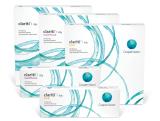Contact lens exams, like all regular eye exams, allow your eye doctor to take a thorough look at the health of your eyes and the quality of your vision. Doing this regularly — about once a year — also lets your eye doctor keep a close eye (if you’ll pardon the pun) on any changes to your vision before they become serious.
However, if you’re a contact lens wearer, it’s important to make sure that your lenses fit both your eyes and your vision properly. In addition to a comprehensive eye exam, a contact lens exam will also involve a contact lens fitting. Here’s what to expect.
Routine, comprehensive eye exams
Whether you have 20-20 vision, eyeglasses or contact lenses, you need regular eye exams to help keep your eyes and vision at their best. Normally, this involves:
- Eye tests to determine your refractive error and prescription
- Cover tests that check how well your eyes work together
- Slit-lamp exams that give your eye doctor a magnified view of the structures in your eyes in order to determine their health
- Eye pressure or “air puff” tests that check for glaucoma
- Pupil dilation that gives your eye doctor a better view of the back of your eyes
- Contact lens fitting
Contact lenses are medical devices, so you need a contact lens prescription in order to buy them, and your eye doctor is required to make sure that your vision examination for your contact lens prescription involves finding the right fit for your lenses.
A contact lens fitting involves both a consultation and measurement.
Your eye doctor will ask you about your lifestyle and preferences. Some contact lenses may be better for athletes with active lifestyles, for instance; others may be better for frequent travelers who might need to occasionally sleep in their contacts. Your eye doctor will also ask you about whether you prefer coloured contact lenses or disposable contacts.
Your eye doctor will also need to gather several measurements. The most common is the curvature of your cornea, your eye’s clear front surface. In some cases, your pupil and iris size will also be measured. If you tend to have dry eyes, your eye doctor may also perform a tear film evaluation to make sure you’re prescribed contact lenses that keep your eyes sufficiently moist.
Remember, your eye doctor is your ally in making sure your eyes get what they need to stay healthy and perform at their best. Make sure you seek professional advice whenever you’re encountering or making changes involving your eyes and vision.
Nothing in this article is to be construed as medical advice, nor is it intended to replace the recommendations of a medical professional. For specific questions, please see your eye care practitioner.






